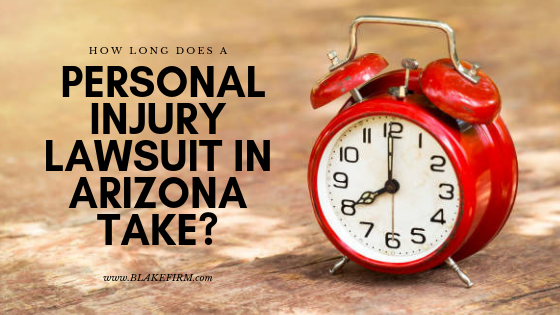How long does a personal injury lawsuit in Arizona take?
How long a case will take to resolve in litigation is dependent on:
(1) Complexity of the case
(2) The amount of money at issue (i.e. the value of the case)
(3) The particular schedule of the attorney’s and the judge assigned to the case.
- (if no settlement is ever reached)
Despite these variables, there is a general answer to this question which includes one additional variable. Litigation occurs when one files a lawsuit. In Arizona, once a lawsuit is filed, you have ninety (90) days to serve the at-fault driver or person responsible for your injuries.
In Arizona, a plaintiff must file a certificate of compulsory arbitration with the Complaint (again the Complaint commences litigation). This certificate determines whether the case is subject to arbitration or not subject to arbitration (arbitration v. trial). The difference is purely monetary. If the case is valued at $50,000 or less, the case is subject to arbitration and litigation will presumably last between 4-6 months from the time a defendant files an answer.
The time for service is entirely dependent upon how quickly the at-fault party can be served. It can take one week or more than 90 days. Once served, a defendant has 20 days to file an answer. The time for a case to resolve from the day the answer is due can take anywhere from 4 months to more than a year, depending on whether litigation means arbitration or trial (this is the one additional variable I referenced earlier).
If the case is valued at more than $50,000, the case will ultimately be scheduled for a jury trial which would not typically occur for at least one year (often more) from the time the defendant files an answer to the complaint.

How long does a personal injury lawsuit in Arizona take?
When it comes to legal processes, few are more time sensitive than personal injury claims. People who have been hurt need compensation as soon as possible so they can begin medical treatment, pay their bills, and generally keep their heads above water. In Arizona, there is a two-year statute of limitations for someone to create a personal injury claim against a negligent party, but how long do they have to wait to get a settlement?
The answer is that there is no set amount. The time it takes between filing a complaint and receiving compensation is entirely dependent on numerous details specific to each claim. If a generalization had to be made, it could be said that a “quick” personal injury claim will take 3 to 4 months to settle; on the other end of the spectrum, a person may need to wait 1 or 2 years. What slows down the settlement process?
The personal injury settlement process in Arizona may be delayed by:
- Plentiful details: More often than not, a plethora of minor details is the culprit. Attorneys and insurance companies need to be careful to comb through each fact surrounding the case. The more there are, the longer it takes, naturally.
- Medical examinations pending: If the injured party has not fully recovered from their injuries, or reached maximum medical improvement, the cost of medical treatment can’t be known. In many cases, it may be possible for an experienced personal injury attorney to correctly estimate the total amount that will eventually be necessary.
- Dispute of liability: A defendant in a personal injury claim won’t offer a settlement, at least not right away, if they do not think they are as responsible for the accident as the plaintiff believes.
- Disagreement over amount: There are times the defendant accepts partial or total liability although is doubtful of the compensation amount demanded. Reviewing the costs of damages may sway them.
- Litigation: If disputes are too numerous, the case may proceed to litigation, which can really cause a delay. Thankfully, at any point during litigation, the defendant may offer a settlement; if the plaintiff accepts it, litigation ends.
Why You Would Settle Before Litigation
The majority of personal injury claims do end in a settlement, rather than a trial verdict. But why is that? If litigation is always an option, wouldn’t it be better to take it to court and let a judge or jury sort it out?
Not necessarily, for there are benefits to settlements. In general, if a settlement is offered by the defendant, it will arrive much sooner than it would have taken to go through a trial. Settlements also usually cause both parties to accrue less legal fees, especially costs that would have gone towards buying the court’s time and attention. Accepting a settlement also allows the plaintiff to get a guaranteed victory, where there is always a chance of losing in court, even with concrete evidence and the world’s best attorney.



